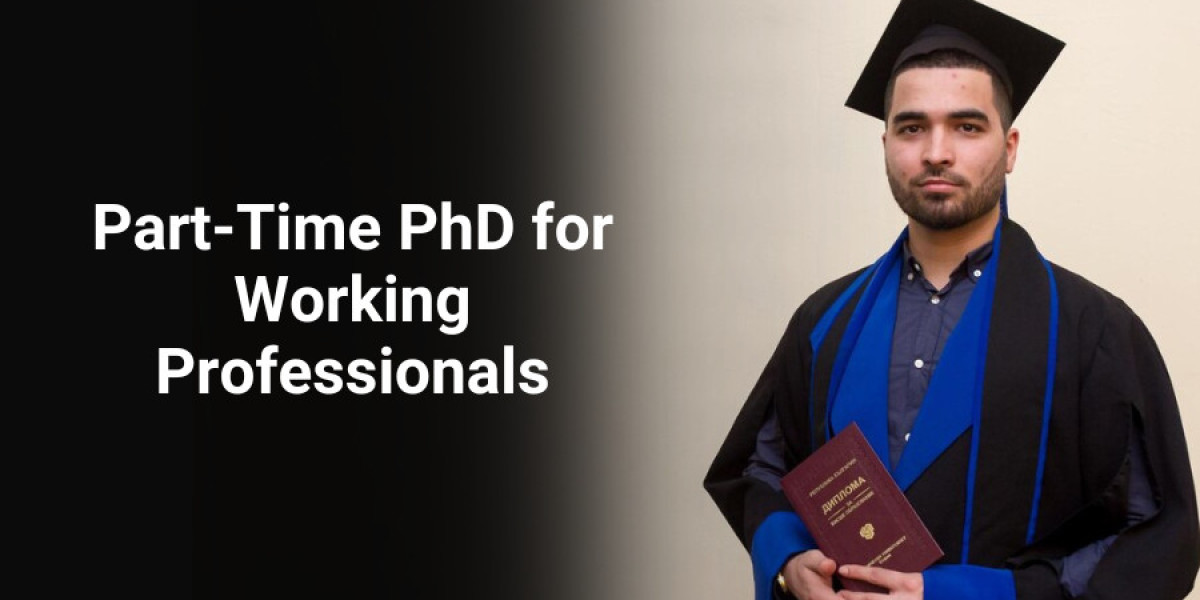In today’s competitive world, professionals are constantly seeking ways to boost their knowledge and credentials. For those aiming to achieve the highest academic qualification without putting their careers on hold, a Part-Time PhD for Working Professionals is a perfect choice. This article explores everything you need to know about pursuing a part-time PhD in India—from eligibility and entrance exams to career scope and benefits.
What is PhD? – PhD Full Form and Meaning
The PhD full form is Doctor of Philosophy. It is the highest academic degree awarded by universities and institutions for research in a specific field of study. Whether you're in science, humanities, management, or engineering, a PhD degree allows you to contribute new knowledge through extensive research.
Why Choose a Part-Time PhD?
A part-time PhD course is ideal for working professionals who wish to continue their jobs while conducting research. Unlike full-time PhD programs that require a regular campus presence, part-time PhD programs offer flexible timelines and research schedules, allowing professionals to balance work, life, and study.
Key Benefits of a Part-Time PhD:
Continue your job while studying.
Apply real-world experience to academic research.
Flexibility in timelines.
Develop deep expertise in your field.
Enhance career growth and academic credibility.
PhD Admission in India: An Overview
1. PhD Admission Process
The PhD admission process in India typically involves:
Meeting eligibility criteria.
Clearing a PhD entrance exam (like UGC NET, CSIR NET, or institutional tests).
Submitting a research proposal.
Appearing for an interview conducted by the university.
2. Eligibility Criteria
To apply for a PhD program, you must:
Hold a Master’s degree in a relevant field with at least 55% marks (5% relaxation for reserved categories).
Some universities may require a minimum number of years of work experience for part-time PhDs.
Candidates must often clear a recognized PhD entrance exam or qualify for exemption based on prior research experience or NET qualifications.
Structure of a Part-Time PhD Program
A part-time PhD program is similar in content and rigor to a full-time program but is designed to accommodate the schedules of working professionals. Here’s what it typically includes:
1. Coursework Phase
Initial one to two years are focused on coursework in research methodology and subject-specific topics.
2. Comprehensive Exam
After coursework, students must clear a comprehensive examination to proceed with their research.
3. Research Phase
This is the longest phase where the candidate works on their thesis or dissertation under the supervision of a guide.
4. Thesis Submission and Viva
After completing the research, the thesis is submitted for evaluation and defended in a viva-voce examination.
PhD Entrance Exams for Part-Time PhD Admission
Most universities in India require candidates to clear a PhD entrance exam for admission. Some common exams include:
UGC NET (University Grants Commission National Eligibility Test)
CSIR NET (Council of Scientific and Industrial Research)
GATE (Graduate Aptitude Test in Engineering) for engineering streams
University-specific PhD entrance tests
Entrance Exam Pattern
Research Aptitude
Subject Knowledge
General Aptitude
Logical Reasoning
How to Prepare for a Part-Time PhD
1. Identify Your Research Interest
Choose a subject area you are passionate about and which aligns with your professional experience.
2. Find the Right University
Look for universities that offer part-time PhD admission in India in your chosen field.
3. Check Eligibility and Entrance Exam Requirements
Some universities may exempt candidates with NET/GATE qualification or extensive industry experience.
4. Prepare a Research Proposal
A well-defined research proposal plays a key role in your admission and helps universities assess your research potential.
5. Time Management
Balancing work and research is crucial. Create a realistic schedule and communicate with your employer for flexible arrangements.
Fields Where Part-Time PhD is Popular
Engineering and Technology
Management
Computer Science
Education
Law
Social Sciences
Commerce and Economics
Career Opportunities After Part-Time PhD
Completing a PhD program (even part-time) significantly enhances your career profile. You can explore roles such as:
University Professor or Lecturer
Research Scientist
Corporate R&D Expert
Policy Analyst
Industry Consultant
Author and Academic Writer
Moreover, a PhD degree increases your chances of promotion to senior roles and contributes to your thought leadership in your domain.
Challenges of a Part-Time PhD
While the benefits are immense, pursuing a part-time PhD is not without challenges:
Balancing job, family, and research can be stressful.
Requires strong self-motivation and discipline.
Access to campus resources may be limited.
However, with proper planning and a clear goal, these challenges can be overcome.
Final Thoughts
A part-time PhD is an excellent opportunity for working professionals who want to advance their academic journey without leaving their careers. It combines flexibility with the rigor of academic research and offers a prestigious qualification that can open doors to new career heights.
Whether you're in business, engineering, or the humanities, choosing the right PhD course, preparing for the PhD entrance exam, and finding a research topic you're passionate about are key steps toward success.s









